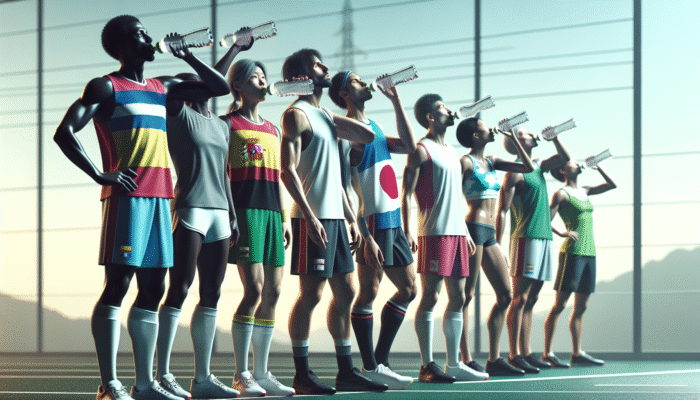Maximise Your Athletic Potential Through Strategic Mental Preparation Techniques
The importance of mental readiness in the pre-workout routines of professional athletes is paramount. Athletes across the globe acknowledge that their psychological state is critical in unlocking their full performance capabilities. By employing a diverse range of techniques such as visualisation, meditation, goal setting, positive self-talk, and breathing exercises, athletes can mentally fortify themselves, ensuring they approach their training sessions with the focus, confidence, and mental fortitude necessary to conquer physical challenges.
Unlock Your Full Potential with Powerful Visualisation Techniques

Imagine yourself poised at the starting line, heart racing and adrenaline coursing through your veins as every muscle is primed for action. This is where visualisation becomes an invaluable asset for athletes. Whether they are marathon runners striving to complete the New York City marathon or sprinters aiming for glory at the Olympic Games, they utilise this powerful mental rehearsal technique to dramatically enhance their athletic performance. By vividly picturing their desired results—such as crossing the finish line triumphantly, executing flawless lifts, or breaking personal records—they create a mental blueprint that sets the stage for success.
Studies have shown that visualisation engages the same neural pathways as actual physical activity. This indicates that mentally rehearsing a workout can significantly boost muscle memory and elevate self-confidence. For instance, a competitive cyclist preparing for an upcoming race may close their eyes, envisioning every twist and turn of the course, visualising the challenging inclines and feeling their strength propel them forward. This practice not only enhances concentration but also fosters a winning mentality.
Moreover, visualisation acts as a powerful calming strategy, aiding athletes in managing pre-competition jitters. By picturing themselves in control and flawlessly executing their routines, they can effectively lower anxiety levels, approaching their workouts with a calm yet determined spirit.
Transform Your Focus and Performance with Effective Meditation Practices
Meditation has proven to be a vital practice for athletes seeking to calm their minds and sharpen their focus. It offers a refuge from the chaos often present in competitive environments, allowing individuals to connect profoundly with their inner selves. This practice enables athletes to centre themselves before undertaking physically demanding tasks, whether they are mountain climbers tackling the Himalayas or football players competing in Texas.
Through mindfulness meditation, athletes cultivate the essential skill of concentrating on the present moment—an invaluable asset when pushing their bodies to their limits. Research suggests that even a brief guided meditation session can significantly bolster focus and diminish stress. For instance, a swimmer preparing for a race might engage in a quick five-minute meditation session before entering the pool, effectively clearing their mind of distractions and honing in on their performance.
Additionally, meditation can be seamlessly integrated into warm-up routines, aiding in a smooth transition into physical activity. The ability to quiet the mind translates into enhanced focus during workouts, a crucial component for achieving peak performance levels.
Set Meaningful and Achievable Goals to Boost Motivation and Track Progress
Establishing clear and achievable goals is fundamental to the pre-workout routines of professional athletes. Athletes worldwide—from marathon runners in Berlin to CrossFit competitors in Australia—leverage goal-setting strategies to maintain motivation and effectively track their progress.
The well-known SMART criteria (Specific, Measurable, Achievable, Relevant, Time-bound) provide a robust framework that assists athletes in articulating their objectives with clarity. For example, a triathlete may aim to enhance their swimming time by ten seconds in an upcoming event. This focused approach enables them to devise actionable steps, such as increasing swim distance and refining their technique, ensuring their commitment and concentration throughout their training journey.
Moreover, setting both short-term and long-term goals instils a sense of purpose and direction within athletes' training. Acknowledging and celebrating small victories reinforces positive behaviours and sustains motivation as they anticipate achieving larger objectives.
Discover the Profound Influence of Positive Self-Talk on Athletic Accomplishments

The impact of language—especially when directed inward—can significantly shape an athlete’s performance. The practice of positive self-talk is a crucial mental strategy employed by professional athletes to enhance their confidence and nurture a constructive mindset.
Imagine a football player gearing up for a pivotal match; they might affirm to themselves, “I am strong. I am capable. I will give my all.” This practice of affirmation not only elevates self-esteem but also acts as a mental barrier against negative thoughts that may threaten performance. Research indicates that athletes who engage in positive self-talk typically experience decreased anxiety levels and are more likely to perform at their best.
Incorporating self-talk into pre-workout rituals can be particularly effective. It can be practised during warm-ups or while mentally preparing for a workout. The key is to tailor affirmations that resonate deeply with the athlete’s values and aspirations, creating a compelling narrative that propels them towards success.
Employ Breathing Techniques to Boost Performance and Foster Calmness
Effective breathing techniques are essential when preparing the body for strenuous physical activity. Controlled breathing exercises enable athletes to manage anxiety, optimise oxygen flow, and maintain composure both before and throughout their workouts.
For instance, envision a weightlifter preparing to lift an impressive weight. Engaging in deep diaphragmatic breathing stabilises their core and enhances oxygen intake, which is vital for optimal muscle function. Research highlights that athletes who incorporate intentional breathing techniques into their routines often experience improved endurance and reduced fatigue during their workouts.
Simple methods, such as the 4-7-8 breathing technique, can be easily integrated into any pre-workout ritual. By inhaling for four counts, holding the breath for seven, and exhaling for eight, athletes can ground themselves and mentally prepare for their upcoming exertion. This practice not only boosts physical readiness but also cultivates a calm and focused mindset.
Strategic Nutritional Approaches for Optimal Performance in Pre-Workout Rituals
Nutrition plays a pivotal role in shaping an athlete's performance, and making strategic dietary choices is essential for the pre-workout rituals of professional athletes. Adequate hydration, timely meals, and informed supplementation can significantly impact an athlete’s energy levels and overall efficacy during workouts, establishing a robust foundation for success.
The Indispensable Role of Hydration in Boosting Athletic Performance

Hydration is not merely a necessity; it is a critical element in achieving peak athletic performance. Athletes from diverse regions—from basketball players in Spain to runners in Tokyo—recognise that dehydration can lead to reduced performance, increased fatigue, and even injury. Therefore, maintaining proper hydration is non-negotiable.
Research indicates that even mild dehydration can severely hinder physical performance. Athletes often start their day with hydration protocols that include water and electrolyte beverages, ensuring they are fully prepared for their workouts. It is recommended that they consume at least 500 mL of fluids a few hours prior to exercising, followed by smaller sips throughout the session to maintain optimal fluid balance.
Furthermore, environmental factors significantly influence hydration needs. In humid conditions, such as those faced by cyclists in Southeast Asia, athletes may require more frequent hydration to counteract excessive fluid loss through sweat. Understanding personal hydration requirements enhances training effectiveness and provides a competitive advantage.
Fuel Your Workouts with Strategic Pre-Workout Meals
The right pre-workout meal can be the decisive factor differentiating a lacklustre training session from an invigorating workout. Athletes intentionally make dietary choices to ensure they consume an optimal balance of carbohydrates and proteins to fuel their bodies effectively.
A typical pre-workout meal might feature oatmeal topped with fruit for carbohydrates, complemented by a scoop of protein powder. This combination delivers sustained energy while supporting muscle repair during and after exercise. Timing is equally crucial; athletes often aim to consume this meal 1-3 hours before their workouts to facilitate proper digestion and nutrient absorption.
Individual preferences and tolerances can vary significantly, prompting athletes to experiment with different food options. For instance, a weightlifter might select a smaller snack like a banana and a protein shake if they have limited time before their workout.
Augment Performance with Intelligent Supplementation Strategies
Athletic performance frequently involves the utilisation of various supplements that, when used judiciously, can significantly enhance energy levels and workout results. Many athletes—from elite sprinters to casual gym-goers—turn to substances like caffeine and creatine to improve their performance.
Caffeine is widely acknowledged for its ability to elevate energy levels and sharpen focus, making it a popular choice among athletes. Research suggests that consuming caffeine approximately 30-60 minutes prior to a workout can greatly enhance endurance and strength performance.
Similarly, creatine has gained recognition for its role in boosting power output and muscle recovery. Many professional athletes integrate creatine into their pre-workout rituals, allowing them to exert greater effort during high-intensity training sessions. However, athletes should consult nutritionists or coaches to develop tailored supplementation strategies that align with their training objectives and dietary needs.
Post-Workout Nutrition: A Critical Element for Recovery and Performance Enhancement
While pre-workout rituals are essential, the importance of post-workout nutrition must not be overlooked. Following intense training sessions, athletes need to prioritise replenishing glycogen stores and repairing muscle tissue. An ideal post-workout meal should encompass a balanced mix of carbohydrates and proteins, which aids in recovery and promotes muscle growth.
After a demanding workout, an athlete may opt for a protein smoothie blended with fruits and spinach, packed with nutrients that support recovery. Studies indicate that consuming this meal within 30 minutes post-exercise maximises glycogen replenishment and accelerates recovery.
Additionally, athletes are increasingly recognising the benefits of whole foods over processed options. Incorporating nutrient-dense foods such as lean meats, leafy greens, and whole grains into post-workout meals can significantly enhance recovery outcomes and improve overall health.
Strategic Meal Timing for Peak Athletic Performance
Meal timing represents a crucial component of an athlete’s nutritional strategy, significantly affecting both performance and recovery. Athletes often adopt strategic eating schedules to optimise nutrient absorption and enhance energy levels, especially during intense training phases.
For instance, many athletes prioritise consuming balanced meals every few hours throughout the day to maintain stable energy levels. The timing of these meals becomes particularly critical when training sessions are closely scheduled; athletes may find success in smaller, more frequent meals to replenish their energy reserves.
Another effective strategy is nutrient timing, where athletes consume specific macronutrients at designated intervals. This approach can be especially beneficial in endurance sports, prompting athletes to fuel with carbohydrates before training and replenish with proteins following workouts. Tailoring meal timing to individual training schedules enables athletes to maximise their performance and recovery effectively.
Comprehensive Warm-Up Routines for Peak Athletic Excellence
The importance of thorough warm-up routines within the pre-workout rituals of professional athletes cannot be overstated. An effective warm-up prepares the body for demanding physical exertion, enhancing performance while minimising the risk of injuries. Athletes globally employ a variety of warm-up techniques, including dynamic stretching, mobility drills, activation exercises, cardiovascular warm-ups, and plyometric movements to ensure they are physically primed for peak performance.
Dynamic Stretching: The Key to Flexibility and Enhanced Blood Circulation
Dynamic stretching is a fundamental aspect of athletes' warm-up regimens. It is specifically designed to improve flexibility and promote blood flow to the muscles engaged during exercise. Unlike static stretches, which may compromise power output, dynamic stretching involves active movements that prepare the body for exertion.
Athletes, whether football players warming up before a match or dancers preparing for a performance, engage in dynamic stretches such as walking lunges, high knees, or arm circles. These movements activate muscles and stimulate the nervous system, enhancing readiness for the physical demands of their respective sports.
Research supports the efficacy of dynamic stretching in preventing injuries. This type of stretching increases the range of motion while promoting better circulation. It is particularly vital in sports where speed and agility are crucial, ensuring that muscles are adequately prepared for explosive movements.
Mobility Drills: Enhance Joint Functionality and Flexibility
Mobility drills encompass a range of movements aimed at improving joint range of motion and overall flexibility. These drills are a staple in the pre-workout rituals of professional athletes across various sports, from basketball to Olympic weightlifting.
Mobility drills specifically target areas such as hips, shoulders, and ankles, enabling athletes to perform at their best while minimising the risk of injury. For instance, a basketball player might incorporate hip openers or shoulder dislocates into their routine, ensuring their joints are agile enough to handle the demands of sudden movements and jumps.
Research indicates that a comprehensive mobility routine enhances performance outcomes by facilitating proper movement patterns. Engaging in these drills not only boosts physical capability but also lays the groundwork for an effective workout regimen.
Activation Exercises: Engage Key Muscle Groups for Optimal Performance
Activation exercises are specifically designed to engage targeted muscle groups before they are called into action during workouts. This focused approach is crucial to ensure that muscles are properly activated and ready for performance, particularly for athletes participating in high-intensity sports.
Common activation exercises include glute bridges, band walks, and scapular push-ups. For example, a sprinter may perform glute activation exercises to ensure their largest muscle group is fully operational during sprinting. By pre-activating muscle groups, athletes can enhance their performance and reduce the risk of injuries caused by muscle imbalances.
Studies have shown that incorporating activation exercises into warm-up routines can significantly increase overall strength and power output during workouts. This preparation not only benefits athletes physically but also promotes better movement mechanics throughout their training sessions.
Cardiovascular Warm-Up: Elevate Heart Rate and Improve Circulation
A proper cardiovascular warm-up is an essential aspect of an effective pre-workout routine. Engaging in light cardiovascular activities, such as jogging, cycling, or jumping jacks, elevates the heart rate and enhances circulation, preparing the body for more intense exercises.
Athletes frequently utilise warm-up drills tailored to their specific sport to progressively increase their heart rate. For instance, a rugby player might incorporate short sprints into their warm-up, mimicking the explosive nature of the sport. This dynamic approach keeps athletes engaged while ensuring their bodies are prepared for the challenges ahead.
Research underscores the importance of an adequate warm-up in enhancing athletic performance. Cardiovascular activities raise muscle temperature, improving pliability and function during training sessions.
Plyometric Exercises: Develop Explosive Strength and Power
Plyometric exercises consist of explosive movements designed to enhance muscle power and coordination. These exercises are particularly beneficial for a dynamic warm-up, ensuring athletes are fully prepared for high-intensity activities.
Examples of plyometric exercises include box jumps, burpees, and clap push-ups. Athletes engaged in sports requiring bursts of speed and strength, such as track and field or football, frequently incorporate plyometric exercises into their warm-up routines. This not only primes their muscles for explosive movements but also aids in developing overall athleticism.
Research indicates that plyometric training can significantly improve performance by enhancing muscle reaction times and power output. Including these exercises in pre-workout rituals helps athletes optimise their results and prepare their bodies for the challenges that lie ahead.
Thorough Gear and Equipment Inspections to Enhance Pre-Workout Rituals
Preparation is essential, and ensuring that gear and equipment are ready for performance is a critical aspect of the pre-workout rituals of professional athletes. Athletes understand that the right clothing, footwear, and equipment can enhance comfort, boost performance, and mitigate the risk of injury.
Selecting the Right Clothing for Optimal Athletic Performance
Choosing suitable workout attire can significantly impact an athlete’s performance. The choice of fabric is vital—moisture-wicking materials assist in regulating body temperature while providing comfort throughout workouts.
Athletes from various backgrounds, whether trail runners in the Swiss Alps or yoga practitioners in Bali, prioritise clothing that offers breathability and flexibility. For instance, a climber may select lightweight, stretchy fabrics that allow for a full range of motion while scaling a rock face.
Seasonal considerations are also crucial; layering becomes essential for outdoor athletes training in variable climates. Research indicates that wearing appropriate gear can enhance athletes' focus and confidence, enabling them to remain comfortable and dry throughout their workouts.
Selecting Footwear for Enhanced Support and Safety
Choosing the right footwear serves as the foundation for any athletic endeavour. Athletes must select shoes that provide adequate support, cushioning, and grip tailored to their specific activities. From marathon runners in Boston to basketball players in Los Angeles, the right shoes can significantly minimise the risk of injury while enhancing overall performance.
When selecting footwear, athletes often consider aspects such as arch support, terrain, and individual gait patterns. Research demonstrates that wearing shoes designed for specific activities can improve performance and reduce the likelihood of injuries, including conditions such as plantar fasciitis or shin splints.
Additionally, testing shoes prior to workouts is crucial to ensure comfort and fit. A well-fitted shoe can greatly influence an athlete's ability to concentrate on their performance rather than discomfort during training.
Conducting Equipment Readiness Checks for Seamless Workouts
Ensuring that all necessary equipment is in optimal condition and ready for use is vital for a successful workout. Athletes often perform equipment readiness checks as part of their pre-workout rituals to prevent interruptions during training sessions.
This could involve inspecting weights for wear and tear or confirming that resistance bands are intact for gym-goers. Conversely, an extreme athlete preparing for a mountain biking session will check their brakes and tyre pressure to ensure safety.
Neglecting this aspect can lead to injury or hinder performance. Research supports that athletes who engage in thorough pre-workout equipment checks report feeling more prepared and confident, allowing them to focus solely on their performance.
Ensuring Sufficient Hydration and Nutrition Supplies
Proper hydration and readily accessible nutritional supplies are essential for sustaining energy levels throughout workouts. Athletes frequently carry water bottles, energy gels, or snacks as part of their pre-workout rituals to guarantee they are equipped for the physical demands of their training.
Athletes involved in endurance sports, such as ultra-marathoners or triathletes, are particularly diligent about planning their hydration and nutrition strategies. During training, they may experiment with various electrolyte drinks or energy bars to discover what fuels their bodies most effectively.
Proper hydration not only enhances performance but also supports recovery following workouts. Studies indicate that athletes who maintain adequate hydration levels are better equipped to perform optimally, making it imperative to prioritise hydration and nutrition supplies as part of workout preparation.
Powerful Psychological Enhancers to Elevate Pre-Workout Rituals for Athletes
The mental component of training is just as crucial as the physical, and psychological boosters play a significant role in the pre-workout rituals of professional athletes. Elements such as music selection, positive affirmations, and social support can greatly enhance motivation and performance.
Utilise Music as a Motivational Force Before Your Workouts
Music serves as a potent motivational tool, energising athletes before their workouts and enriching their overall experience. Athletes across various disciplines—from powerlifters in Australia to dancers in Brazil—frequently curate playlists that inspire them and elevate their spirits prior to physical exertion.
Research indicates that listening to music can enhance athletic performance by increasing endurance and diminishing the perception of effort. For instance, a runner may create a high-tempo playlist that invigorates them during training, establishing a rhythm that aligns with their movements.
Furthermore, an emotional connection to specific songs can evoke nostalgia and empowerment, enriching an athlete's mindset as they prepare for their workouts. The right music can act as a catalyst for a successful training session, transforming the mental landscape into one filled with positivity and determination.
The Transformative Power of Positive Affirmations on Athletic Mindset
Incorporating positive affirmations into pre-workout rituals can profoundly impact an athlete's mindset and self-confidence. By affirming their capabilities—such as “I am strong, capable, and ready”—athletes cultivate a mental environment conducive to achieving success.
Research has demonstrated that athletes who practise positive self-affirmation are less likely to experience performance anxiety and self-doubt. This technique is prevalent among elite athletes, from tennis players at Wimbledon to Olympic gymnasts, who understand the importance of a confident mindset in realising their objectives.
Athletes can practise affirmations as part of their warm-up routines or pre-competition preparations, often reciting them while visualising their performances. This practice reinforces their belief in their abilities, fostering a steadfast commitment to their training.
The Essential Role of Social Support in Achieving Athletic Success
Building a supportive network is a fundamental psychological booster for athletes. Having a workout partner or being part of a supportive community provides encouragement, accountability, and camaraderie, proving invaluable during challenging training sessions.
Athletes from around the world—from cyclists in the Netherlands to swimmers in Australia—frequently share their goals with friends, family, or teammates. This social connection fosters accountability, motivating them to stay committed to their training schedules.
Research highlights the psychological benefits of social support in sports, suggesting that athletes engaged with supportive communities report higher levels of motivation and satisfaction. Sharing experiences, both good and bad, creates a positive environment that can significantly enhance overall performance.
Consistency in Routine: The Cornerstone of Effective Pre-Workout Rituals for Athletes
Establishing routine consistency is vital for athletes looking to optimise their performance. A disciplined approach to training aids athletes in maintaining focus and direction, transforming their pre-workout rituals of professional athletes into effective habits.
Create a Consistent Workout Schedule for Lasting Success
Consistency breeds success, and establishing a workout schedule is foundational for building a sustainable routine. Athletes from diverse backgrounds—sprinters in Kenya or weightlifters in Canada—develop regular training times that align with their lifestyles.
A structured schedule enables athletes to cultivate discipline, making it easier for them to commit to their training objectives. Research emphasises that scheduled workouts lead to enhanced adherence and improved performance outcomes as athletes adapt to their training rhythm.
Moreover, a consistent workout schedule assists athletes in managing their time efficiently, balancing training with other commitments. This approach keeps them accountable and reinforces their focus on long-term goals, paving the way for sustained success.
The Benefits of a Pre-Workout Checklist for Enhanced Preparation
Creating a pre-workout checklist serves as an effective strategy to ensure that all rituals are completed before training. A systematic approach to preparation enhances focus and minimises distractions, allowing athletes to fully immerse themselves in their workouts.
A typical checklist may include hydration levels, nutrition supplies, gear readiness, and mental preparation techniques. For instance, a marathon runner might check off each item as they prepare, ensuring they have everything necessary for their training session.
This practice fosters a sense of accomplishment, promoting a focused mindset as athletes transition into their workouts. Research indicates that athletes who utilise checklists report feeling more prepared and confident, thus enhancing their overall performance.
Embrace Adaptability for Continued Growth and Improvement
Flexibility within routines enables athletes to adapt to changing circumstances while preserving workout effectiveness. Life can be unpredictable, and the ability to modify training plans is critical for long-term success.
Athletes worldwide—from triathletes in New Zealand to dancers in France—recognise that adapting to changes, whether in daily schedules or environmental conditions, is part of their journey. Developing the capacity to alter routine elements, such as warm-ups or nutritional strategies, ensures that athletes remain on track even when faced with challenges.
Research suggests that athletes who embrace adaptability in their training routines experience fewer setbacks and demonstrate greater resilience in their pursuit of excellence. By nurturing this mindset, athletes can effectively navigate challenges while maintaining their commitment to achieving their goals.
Common Queries Regarding Pre-Workout Rituals
What are pre-workout rituals?
Pre-workout rituals refer to systematic routines or practices that athletes engage in to mentally and physically prepare for their workouts. These rituals encompass mental preparation techniques, nutritional strategies, and physical warm-ups designed to enhance performance.
Why is mental preparation essential for athletes?
Mental preparation is crucial as it enhances an athlete's focus, reduces anxiety, and boosts confidence before workouts, ultimately leading to improved performance and overall success in their respective sports.
What should I consume before my workout?
A well-balanced pre-workout meal should include carbohydrates for energy and protein for muscle support. For optimal performance, aim to consume this meal 1-3 hours before training.
How can I maintain hydration during workouts?
To stay hydrated, drink water regularly throughout the day and ensure you hydrate before, during, and after workouts. Electrolyte drinks can also be beneficial for prolonged exercise, helping to replenish lost fluids and minerals.
What are activation exercises, and why are they important?
Activation exercises are targeted movements designed to engage specific muscle groups in preparation for physical activity. Examples include glute bridges and shoulder dislocates, which help ensure muscles are ready to perform effectively during workouts.
How does music affect athletic performance?
Listening to energising music can enhance motivation, increase endurance, and improve the overall workout experience by elevating mood and focus, creating a conducive environment for training.
What are some effective breathing techniques for athletes?
Effective breathing techniques include deep diaphragmatic and rhythmic breathing practices, which help manage anxiety and enhance oxygen flow during workouts, promoting better performance and recovery.
How does social support benefit athletes?
Social support provides athletes with encouragement and accountability, leading to increased motivation and satisfaction, which enhances their commitment to training and overall performance in their sport.
Why is meal timing significant for athletes?
Meal timing is crucial as it optimises nutrient absorption, fuels performance, and supports recovery. This is especially vital for athletes with rigorous training schedules who want to maximise their results.
How can I create a successful workout schedule?
To create a successful workout schedule, establish consistent training times that fit your lifestyle, set clear goals, and remain flexible to adapt to changes while maintaining discipline in your training plan.
Connect with us on Facebook!
The Article Pre-Workout Rituals of Pros: A Universal Guide appeared first on https://athleticsupplement.com
The Article Pre-Workout Rituals: A Comprehensive Guide for Athletes Was Found On https://limitsofstrategy.com
The Article Pre-Workout Rituals for Athletes: Your Essential Guide found first on https://electroquench.com

